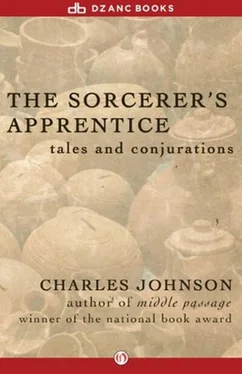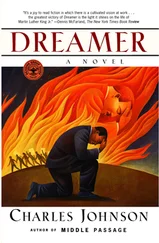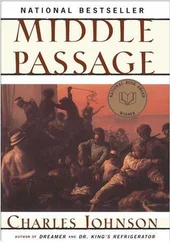Charles Johnson - Sorcerer's Apprentice
Здесь есть возможность читать онлайн «Charles Johnson - Sorcerer's Apprentice» весь текст электронной книги совершенно бесплатно (целиком полную версию без сокращений). В некоторых случаях можно слушать аудио, скачать через торрент в формате fb2 и присутствует краткое содержание. Год выпуска: 2014, Издательство: Dzanc Books, Жанр: Современная проза, на английском языке. Описание произведения, (предисловие) а так же отзывы посетителей доступны на портале библиотеки ЛибКат.
- Название:Sorcerer's Apprentice
- Автор:
- Издательство:Dzanc Books
- Жанр:
- Год:2014
- ISBN:нет данных
- Рейтинг книги:3 / 5. Голосов: 1
-
Избранное:Добавить в избранное
- Отзывы:
-
Ваша оценка:
- 60
- 1
- 2
- 3
- 4
- 5
Sorcerer's Apprentice: краткое содержание, описание и аннотация
Предлагаем к чтению аннотацию, описание, краткое содержание или предисловие (зависит от того, что написал сам автор книги «Sorcerer's Apprentice»). Если вы не нашли необходимую информацию о книге — напишите в комментариях, мы постараемся отыскать её.
Sorcerer's Apprentice — читать онлайн бесплатно полную книгу (весь текст) целиком
Ниже представлен текст книги, разбитый по страницам. Система сохранения места последней прочитанной страницы, позволяет с удобством читать онлайн бесплатно книгу «Sorcerer's Apprentice», без необходимости каждый раз заново искать на чём Вы остановились. Поставьте закладку, и сможете в любой момент перейти на страницу, на которой закончили чтение.
Интервал:
Закладка:
“Wrong?” The boy returned. He held a match close to the bowl of Rubin’s pipe, cupping the flame. “Then why do you do it?”
“It works best for me that way, Allan. I have arthritis.” He slanted his eyes left at his pupil. “Do you?”
The years passed, and Allan improved, even showing a certain flair, a style all his own that pleased Rubin, who praised the boy for his native talent, which did not come from knowledge and, it struck Allan, was wholly unreliable. When Esther Peters, a seamstress, broke her hip, it was not Rubin who the old woman called, but young Allan, who sat stiffly on a fiddle-back chair by her pallet, the fingers of his left hand spread over the bony ledge of her brow and rheumy eyes, whispering the rune that lifted her pain after Esther stopped asking, “Does he know what he doing, Rubin? This ain’t how you did when I caught my hand in that cotton gin.” Afterwards, as they walked the dark footpath leading back to the river, Rubin in front, the Sorcerer shared a fifth with the boy and paid him a terrifying compliment: “That was the best I’ve seen anybody do the spell for exorcism.” He stroked his pupil’s head. “God took holt of you back there — I don’t see how you can do it that good again.” The smile at the corners of Allan’s mouth weighed a ton. He handed back Rubin’s bottle, and said, “Me neither.” The Sorcerer’s flattery, if this was flattery, suspiciously resembled Halloween candy with hemlock inside. Allan could not speak to Rubin the rest of that night.
In the old days of sorcery, it often happened that pupils came to mistrust most their finest creations, those frighteningly effortless works that flew mysteriously from their lips when they weren’t looking, and left the apprentice feeling, despite his pride, as baffled as his audience and afraid for his future — this was most true when the compliments compared a fledgling wizard to other magicians, as if the apprentice had achieved nothing new, or on his own. This is how Allan felt. The charm that cured Esther had whipped through him like wind through a reedpipe, or — more exactly, like music struggling to break free, liberate its volume and immensity from the confines of wood and brass. It made him feel unessential, anonymous, like a tool in which the spell sang itself, briefly borrowing his throat, then tossed him, Allan, aside when the miracle ended. To be so used was thrilling, but it gave the boy many bad nights. He lay half on his bed, half off. While Rubin slept, he yanked on his breeches and slipped outside. The river trembled with moonlight. Not far away, in a rowboat, a young man unbuttoned his lover. Allan heard their laughter and fought down the loneliness of a life devoted to discipline and sorcery. So many sacrifices. So many hours spent hunched over yellow, worm-holed scrolls. He pitched small pebbles into the water, and thought, If a conjurer cannot conjure at will, he is worthless. He must have knowledge, an armory of techniques, a thousand strategies, if he is to unfailingly do good. Toward this end the apprentice applied himself, often despising the spontaneity of his first achievement. He watched Rubin Bailey closely until on his fifth year on the river he had stayed by the Sorcerer too long and there was no more to learn.
“That can’t be,” said Allan. He was twenty-five, a full sorcerer himself by most standards, very handsome, more like his father now, at the height of his technical powers, with many honors and much brilliant thaumaturgy behind him, though none half as satisfying as his first exorcism rune for Esther Peters. He had, generally, the respect of everyone in Abbeville. And, it must be said, they waited eagerly for word of his first solo demonstration. This tortured Allan. He paced around the table, where Rubin sat repairing a fishing line. His belongings, rolled in a blanket, lay by the door. He pleaded, “There must be one more strategy.”
“One more maybe,” agreed the Sorcerer. “But what you need to know, you’ll learn.”
“Without you?” Allan shuddered. He saw himself, in a flash of probable futures, failing Rubin. Dishonoring Richard. Ridiculed by everyone. “How can I learn without you?”
“You just do like you did that evening when you helped Esther Peters….”
That wasn’t me, thought Allan. I was younger. I don’t know how, but everything worked then. You were behind me. I’ve tried. I’ve tried the rain-making charm over and over. It doesn’t rain! They’re only words!
The old Sorcerer stood up and embraced Allan quickly, for he did not like sloppy good-byes or lingering glances or the silly things people said when they had to get across a room and out the door. “You go home and wait for your first caller. You’ll do fine.”
Allan followed his bare feet away from the houseboat, his head lowered and a light pain in his chest, a sort of flutter like a pigeon beating its wings over his heart — an old pain that first began when he suspected that pansophical knowledge counted for nothing. The apprentice said the spell for fair weather. Fifteen minutes later a light rain fell. He traipsed through mud into Abbeville, shoved his bag under an empty table in a tavern, and sat dripping in the shadows until he dried. A fat man pounded an off-key piano. Boot heels stamped the floor beneath Allan, who ordered tequila. He sucked lemon slices and drained off shot glasses. Gradually, liquor backwashed in his throat and the ache disappeared and his body felt transparent. Yet still he wondered: Was sorcery a gift given to a few, like poetry? Did the Lord come, lift you up, then drop you forever? If so, then he was finished, bottomed out, bellied up before he even began. He had not been born among the Allmuseri Tribe in Africa, like Rubin, if this was necessary for magic. He had not come to New Orleans in a slave clipper, or been sold at the Cabildo, if this was necessary. He had only, it seemed, a vast and painfully acquired yet hollow repertoire of tricks, and this meant he could be a parlor magician, which paid well enough, but he would never do good. If he could not help, what then? He knew no other trade. He had no other dignity. He had no other means to transform the world and no other influence upon men. His seventh tequila untasted, Allan squeezed the bridge of his nose with two fingers, rummaging through his mind for Rubin’s phrase for the transmogrification of liquids into vapor. The demons of drunkenness (Saphathoral) and slow-thinking (Ruax) tangled his thoughts, but finally the words floated topside. Softly, he spoke the phrase, stunned at its beauty — at the Sorcerer’s beauty, really — mumbling it under his breath so no one might hear, then opened his eyes on the soaking, square face of a man who wore a blue homespun shirt and butternut trousers, but had not been there an instant before: his father. Maybe he’d said the phrase for telekinesis. “Allan, I’ve been looking all over. How are you?”
“Like you see.” His gaze dropped from his father to the full shot glass and he despaired.
“Are you sure you’re all right? Your eyelids are puffy.”
“I’m okay.” He lifted the shot glass and made its contents vanish naturally. “I’ve had my last lesson.”
“I know — I went looking for you on the river, and Rubin said you’d come home. Since I knew better, I came to Abbeville. There’s a girl at the house wants to see you — Lizzie Harris. She was there when you sawed Deacon Wills in half.” Richard picked up his son’s bag. “She wants you to help her to—”
Allan shook his head violently. “Lizzie should see Rubin.”
“She has.” He reached for Allan’s hat and placed it on his son’s head. “He sent her to you. She’s been waiting for hours.”
Much rain fell upon Allan and his father, who walked as if his feet hurt, as they left town, but mainly it fell on Allan. His father’s confidence in him was painful, his chatter about his son’s promising future like the chronicle of someone else’s life. This was the night that was bound to come. And now, he thought as they neared the tiny, hip-roofed farmhouse, swimming in fog, I shall fall from humiliation to impotency, from impotency to failure, from failure to death. He leaned weakly against the porch rail. His father scrambled ahead of him, though he was a big man built for endurance and not for speed, and stepped back to open the door for Allan. The Sorcerer’s apprentice, stepping inside, decided quietly, definitely, without hope that if this solo flight failed, he would work upon himself the one spell Rubin had described but dared not demonstrate. If he could not help this girl Lizzie — and he feared he could not — he would go back to the river and bring forth demons — horrors that broke a man in half, ate his soul, then dragged him below the ground, where, Allan decided, those who could not do well the work of a magician belonged.
Читать дальшеИнтервал:
Закладка:
Похожие книги на «Sorcerer's Apprentice»
Представляем Вашему вниманию похожие книги на «Sorcerer's Apprentice» списком для выбора. Мы отобрали схожую по названию и смыслу литературу в надежде предоставить читателям больше вариантов отыскать новые, интересные, ещё непрочитанные произведения.
Обсуждение, отзывы о книге «Sorcerer's Apprentice» и просто собственные мнения читателей. Оставьте ваши комментарии, напишите, что Вы думаете о произведении, его смысле или главных героях. Укажите что конкретно понравилось, а что нет, и почему Вы так считаете.












